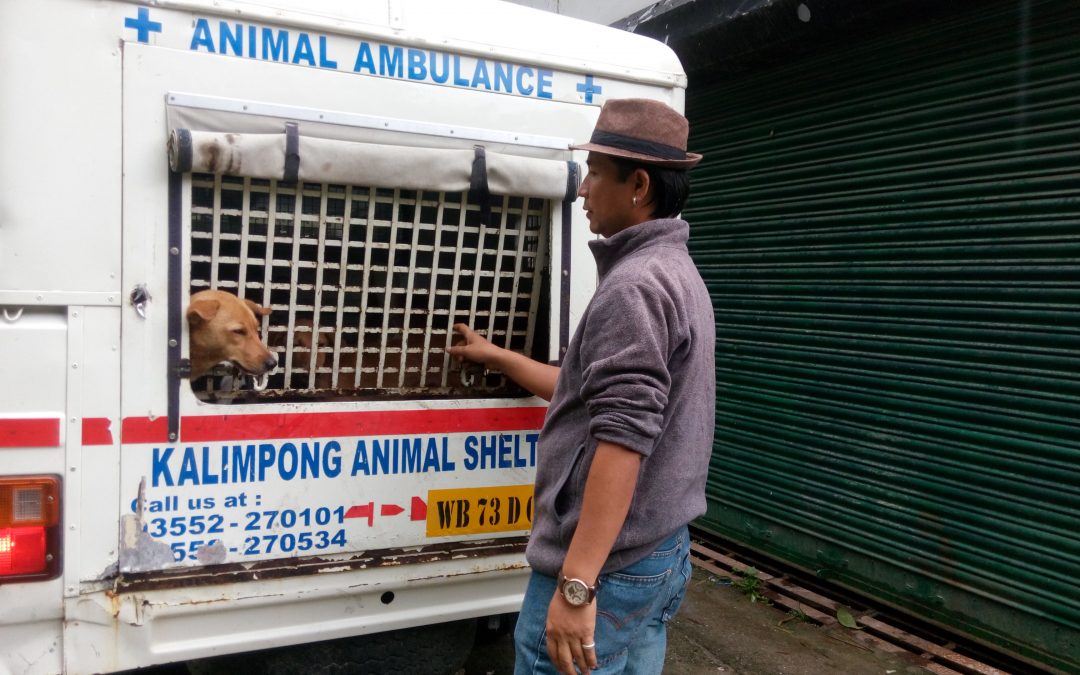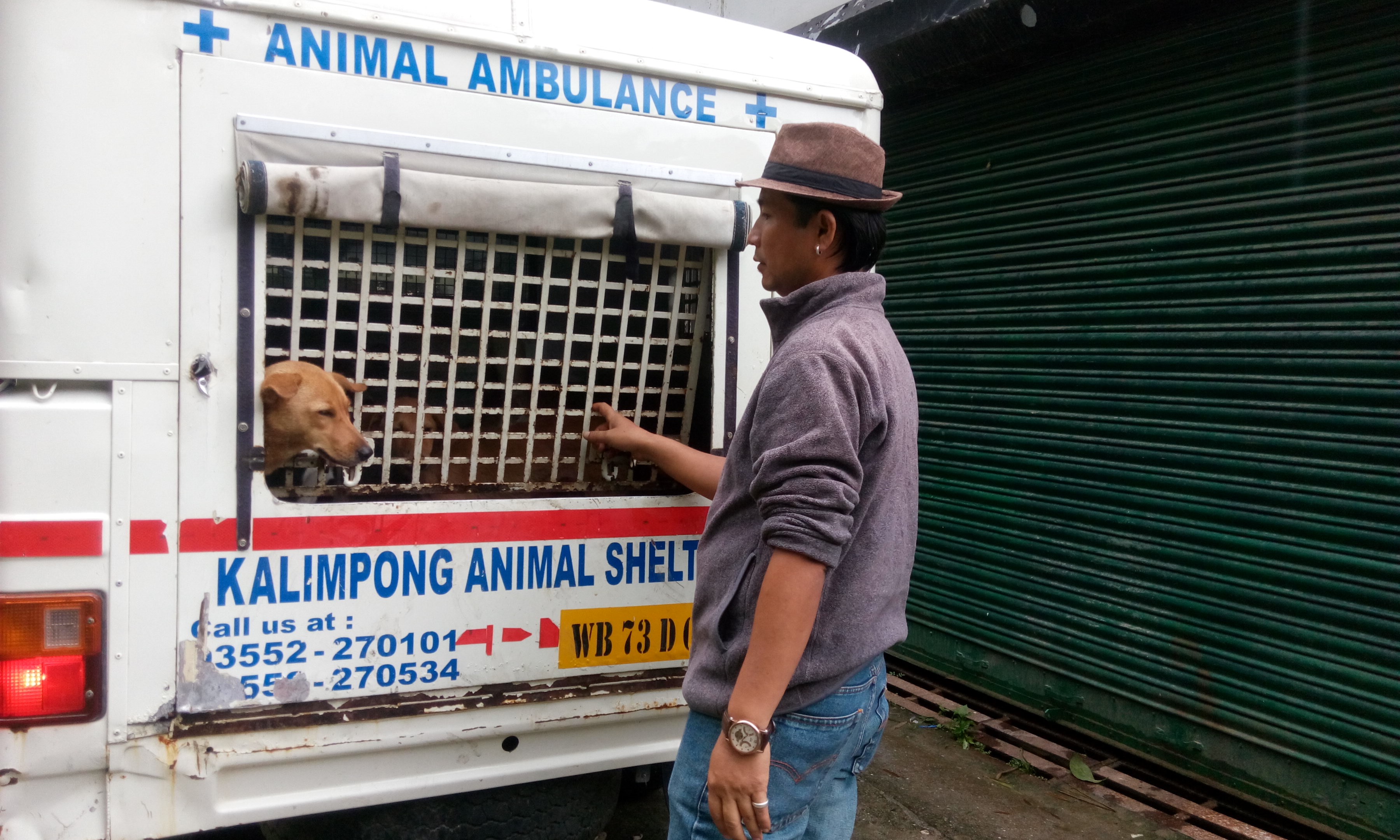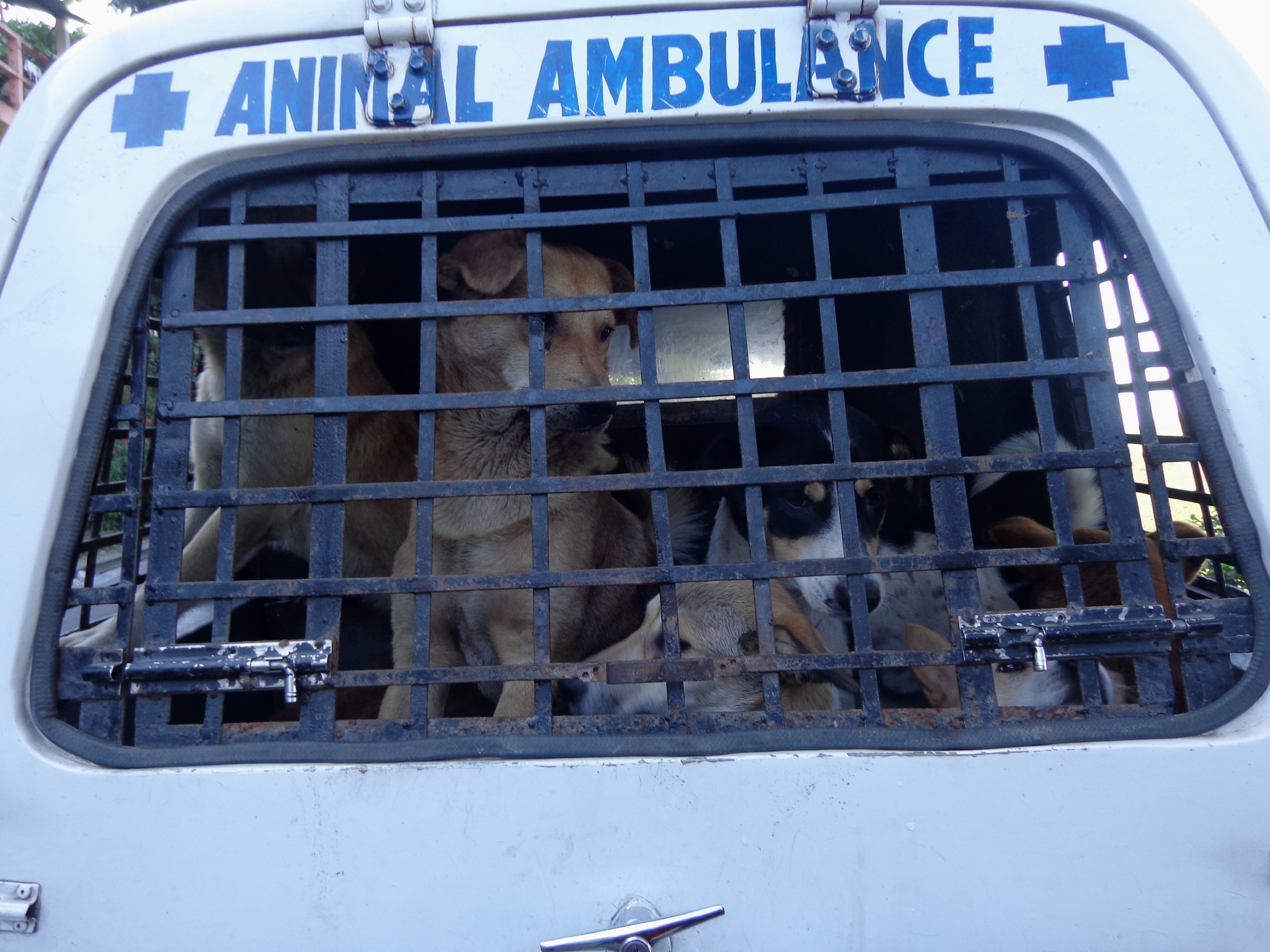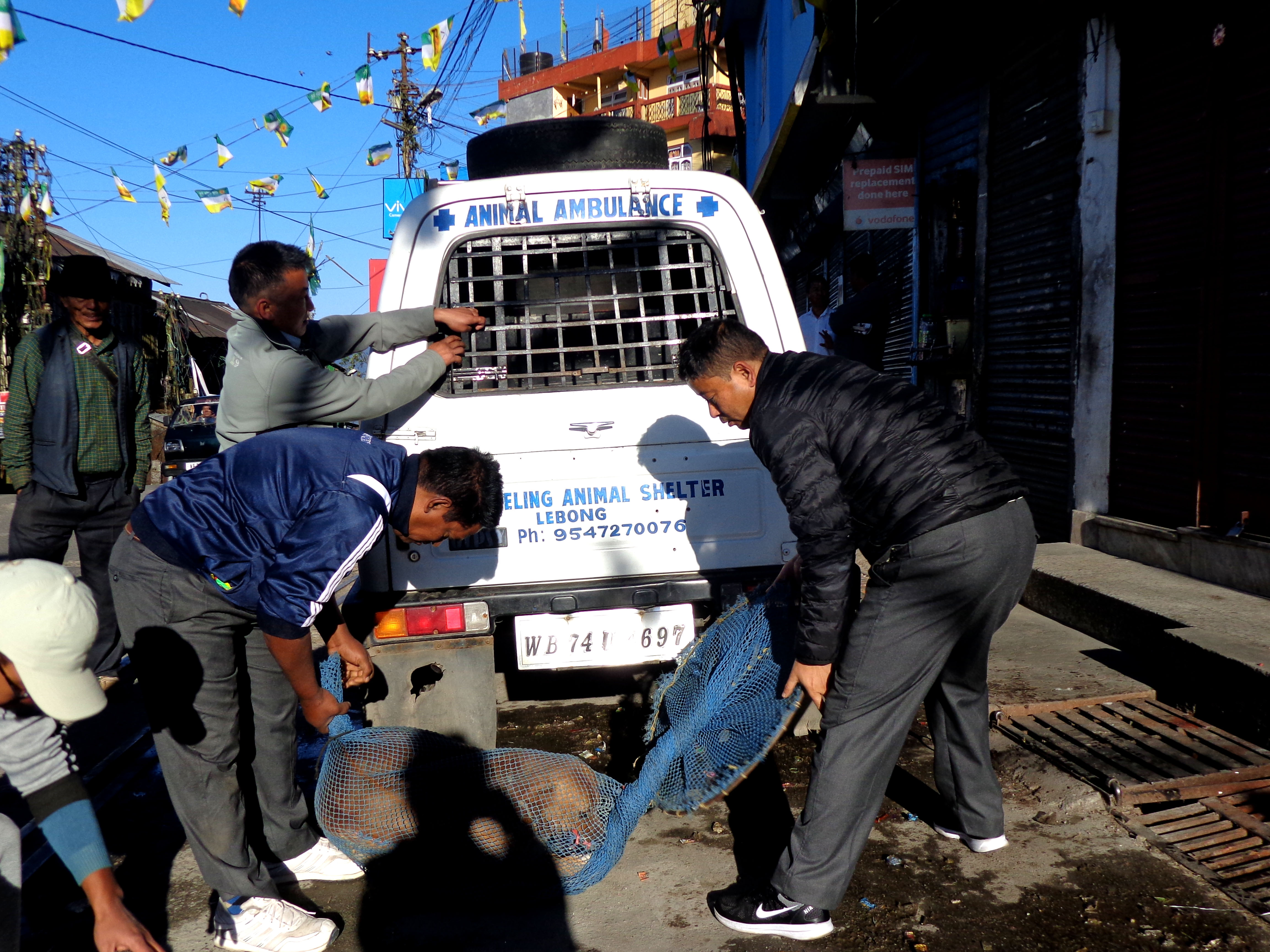
Animal Birth Control in Kurseong ,2019
For the past decade, Kalimpong Animal Shelter has been of great importance to not only animals but also humans. To help distant places and towns where Shelter for animals doesn’t exist, Kalimpong Animal Shelter has extended a helping hand to those in need.
Kurseong, is another close hill station in Darjeeling district. Because of its scenic beauty, it attracts tourists every year. And it has an average population of both humans and animals. People there love dogs equally but mostly, the owners there do not have access to an animal shelter. Although the Govt, Veterinary Department exists there where owners take in their dogs for treatment however, due to lack of Shelter home for the treatment of animals and their birth control, many of them contact Darjeeling and Kalimpong Animal Shelter for help.
In the last four years, sister Shelters, Kalimpong and Darjeeling have travelled to Kurseong for Animal Birth Control. With the start of Darjeeling Animal Shelter by Dr. Christine in 2005, Kurseong could also benefit a little from the Shelter home in Darjeeling. From strychnine poisoning to rabies deaths, and destabilization of dog population, Darjeeling Animal Shelter has played a role in both Darjeeling and Kurseong after the Shelter began its work. So to help Kurseong, Darjeeling Animal Shelter along with the sister shelter in Kalimpong commenced Animal Birth Control camp. And now this is in operation where the Shelter visits twice a year and halts in kurseong for the successful birth control programme on street dogs and owners.
Such an initiative is also because of the compassionate teachers of St. Alphonsus’ School in Kurseong. The teachers there have a wing and apart from their professional career, they work in a team in raising awareness and controlling the dog population through ABC . Every year, they approach the Shelter Vet, Dr. D.P.Pandey for the camp schedule. Mr. Angad, and his team of members then organise the venue and inform the neighbourhood about the implementation of camps.
They also hire volunteers, school students who can take part in camp. It’s usually a two day camp with large numbers of dogs. The Shelter team travels to Kurseong a day prior to the schedule camp and they catch street dogs for spaying. The School teachers also give shelter to dogs that undergo spay and take care of them until their post-operative care. In the, some of the community members also volunteers in helping the dogs recover and relocating them from where they were caught post-surgery.
The camp mostly is conducted for street dogs but owners are also welcome and many bring for the same and vaccinations against rabies. On 8th and 9th June this year, the ABC camp was held on the premises of St. Alphonsus’. There were numerous dogs to be operated thus; the camp was split into two days. The Shelter Vet of Kalimpong Animal Shelter, Dr. Deo Prakash Pandey and team along with the Vet, Dr. Mihir and team of Darjeeling Goodwill Animal Shelter performed spay on 64 dogs. Most of them were female dogs and a few male dogs. Also a few owner cats were present for spay. The two days camp was successful not just because of the Shelter team that conducted spays on big numbers but also because of those wonderful and helpful teachers from St. Alphonsus’ Kurseong. They have arranged camps in Kurseong year after year for the welfare of street dogs in which KAS and DAS have always been an integral part of such Animal Birth Control camps.
The people of Kurseong and teachers of St. Alphonsus’ were very thankful for the work of KAS and DAS thus saving lives of many street and owner dogs in the Hills.




Half-Yearly Brief From Kalimpong Animal Shelter ( KAS)
16th October 2009
Dog ABC programme- KAS has been carrying on the dog ABC programme on the guidelines mentioned in the HIS-ABC manual, the difference being, effortless dog catching method in Kalimpong, where dogs are friendly and are community dogs unlike Jaipur where they are more like stray dogs. Here dogs are lured with biscuits and then held under arms and gently put in the ambulance. More than often the local people do this task of catching. Every dog gets personal care while being at KAS. The number of dogs under our ABC programme from April 2007 to Sept 2007 is 284. KAS has developed expertise in conducting ABC camps in villages where operations are done in the villages. Pic a shows ABC surgery in a remote village in Hills. Pic b shows a dog and a cat being kept warm post operatively in field surgery.
Impact of dog ABC- The much talked sights of puppies running behind lactating bitches, puppies dying around, road accidents of dogs and poor general health of dogs in the streets have become a matter of the past here in Kalimpong. It is so conspicuous that few tourists did make an enquiry in the town to know if some ABC programme was going on and later visited shelter. Pic c shows visitors in shelter.
Anti rabies vaccination ( ARV)- Unlike Jaipur, where male dogs are caught and brought to HIS for ARV and ear notching, KAS vaccinates male dogs on the streets only but we don’t ear notch them for identification. This is possible here again because dogs are friendlier and the community is more involved. In the first six months 1163 dogs have been vaccinated against rabies. Pic d shows kids bringing their community dogs for ARV.
Impact of ARV- For the consecutive fifth year there has not been an incidence of rabies outbreak in humans in our ABC zone. This has helped building a mutually respectable relationship between the dogs and humans.
Adoptions- As mentioned above, there are not many free roaming puppies around here. We have been able to get very good homes for all the puppies we ever come across. 16 dogs and 4 cats were re-homed since April this year. All the puppies are vaccinated against rabies, distemper, parvo virus and then spayed before putting for adoptions. We have people waiting for puppies. A record is maintained of people in waiting.
Village camps – Village camps differ here from HIS in the sense that we cover a series of villages once we leave shelter for camps. Such camps are held for a period of 7 to 10 days. During such camps the ambulance is parked at one village and then the team (one vet and three staff) marches on foot walking village to village and door to door, for a week or more, in the difficult terrain where there are neither jeepable roads nor electricity. Such villages are cut off from any modern flair and people sustain on bare minimum. Every domestic animal is examined, animal husbandry practices are monitored and people are explained about the mistakes in their rearing. Sometimes villagers have been observed following a practice which does not conform to the welfare of the animals but it is our observation that people do such things out of ignorance only and they are ready for change. Apart from the domestic animals all available dogs are vaccinated and the female dogs are spayed. Such camps give good platform for awareness education. Pic e shows the mighty Kanchenjungha mountains in the back while walking up and pic f shows the team walking a tough terrain. Pic g and pic h show the night life during camps. Pic i shows the team interacting with the villagers. Pic j shows the economic feature of the area.
Dispensary – KAS runs a dispensary/clinic for animals same as Jaipur. But it grossly differs in the number and timing of people bringing their animals. In Jaipur, people follow the timing displayed outside dispensary and the cases are concentrated during those hours only. Here at KAS, people bring their animals when “they” are free or have finished with their routine farming activities (our shelter is set up in village area) which is generally beyond normal working hours. Again, people can bring only pets to our dispensary, not their domestic animals, as a sick large animal cannot be made to walk up and down the hill. In such cases, the vet and staff walk through the paddy fields and attend cases even at night. Pic k shows the morning dispensary in shelter.
A total of 2538 animals (pets and domestic animals) were treated in the last six months.
Cat ABC programme- We come across very beautiful cats around here in Kalimpong. They breed very fast. Majority of the kitten used to die of starvation. The remaining used to suffer in the hands of kids who used them as toys and sometimes squeezed them to death. There was a huge need of cat ABC programme in hills, one of its kinds in India as cat ABC is yet not a popular concept in India. Last year, we were fortunate to get fund from the the Marchig Trust, UK, to build a cattery, good enough to hold 10-12 cats. During my recent visit to Austin Humane Society, Texas, I was involved in Feral Cat ABC programme and benefited a lot. After return, I came to know that Animal Protection Network, Sweden is willing to sponsor a cat ABC programme for our shelter. We prepared bilingual awareness leaflets about need and effects of spay/neuter for cats. The local people were informed through leaflets, posters, local cable TV and newspapers and our first cat ABC started in the third week of June 2007. Response of people has been overwhelming so far. Our approach briefly is – we distribute suitable baskets to a section of community/volunteers on Thursday evening and collect the cats on Friday morning in baskets. Each cat is examined and operated and vaccinated on Friday. Upon recovery they are returned to the people to take care at home or kept at the shelter overnight, if needed. In the last three months 102 cats have been operated. Pic l shows cat collection in secured and safe basket and pic m shows cat ABC in progress. Pic n shows a cat recovering in the cattery.
Darjeeling infrastructure development- A new animal shelter is being built in LeBong, 10 kilometers from Darjeeling. We are involved as volunteer from HIS for the Darjeeling Goodwill Animal Shelter to ensure building the most feasible and best possible working infrastructure in one of the most difficult, both politically and geographically, part of India. One staff is stationed there to monitor and report the building process. Pic o and pic p show the building in progress at LeBong, Darjeeling.
Human Resource Management at Kalimpong- Please note, that everyone working at Kalimpong is happy and content with their respective remuneration in turn of their services for the shelter. This was revealed during a formal meeting two weeks back at the shelter. In the meeting were present Christine, Nirmalji, Chawlaji and all the employees of KAS. The staff expressed their gratitude and promised undivided loyalty and commitment to shelter’s work for animal welfare. Their dignified gesture touched Chawlaji, Nirmalji and Christine. Chawlaji was prompt in expressing his delight over the general cleanliness of the shelter and the staff. He avidly acknowledged that everything looked very orderly and professional. He proposed that there should be an exchange programme of the staff between Jaipur and Kalimpong. There exists a very healthy working ambiance at KAS. Our office manager, Arpan, is working hard and keeps pace with the increasing number of projects, thus expenses and subsequently more entries in accounts books. We have a cordial relationship with the Kalimpong Municipality, Gram Panchayats and local clubs. Rotary Club, Kalimpong collaborates with us in some of the village camps. The local print and electronic media is more than willing to cover our activities. Pic q shows staff smiling with dignity while at work.
Beautiful temptation- I cannot restrain myself from sending pic r and pic s just to illustrate that we, at Kalimpong Animal Shelter, are privileged to be working in one of the most beautiful parts of the world. The two snaps are taken from a distance which is less than ten minutes from the shelter during evening walks along the ridge.
Regards
Dr Naveen Pandey
Shelter Vet
Kalimpong Animal Shelter





